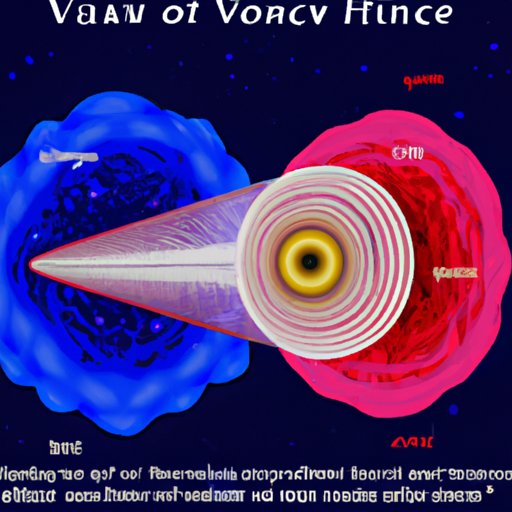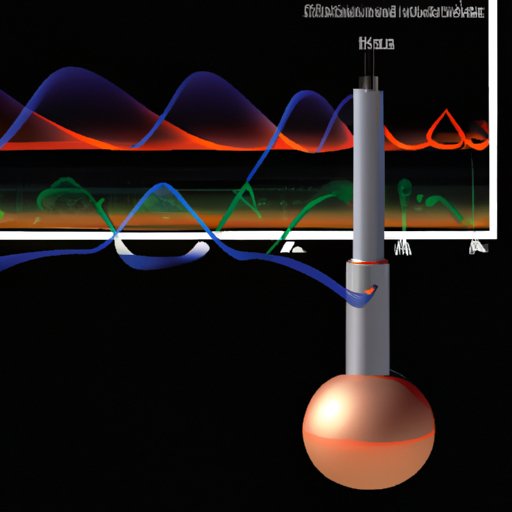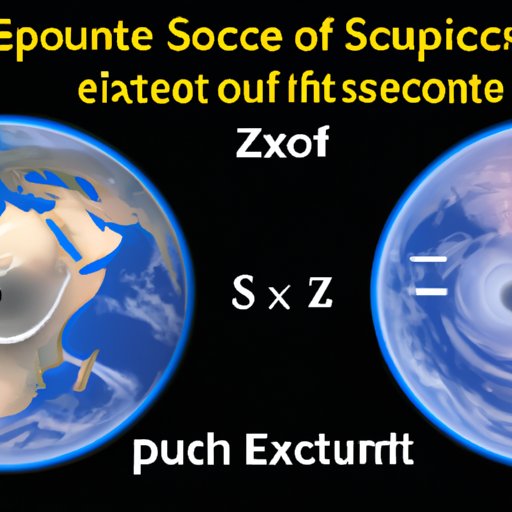Introduction
Sound is a mechanical wave that is created when a vibration causes a series of compressions and rarefactions in a medium, such as air or water. In this article, we will explore why sound cannot travel through space. We will look at the physics behind why sound cannot propagate in outer space, examine the absence of a medium for sound to transmit through, analyse the lack of air pressure needed for sound waves to exist in space, compare sound propagation on Earth to that in outer space, investigate how light and other forms of radiation can travel through space but not sound, and understand the role of temperature in preventing sound from travelling through space.

Exploring the Vacuum of Space and Why Sound Cannot Travel Through It
The vacuum of space is an area devoid of matter, meaning that there are no particles present to act as a medium for sound waves to travel through. This is due to the fact that sound is a mechanical wave, which needs a medium in order to be transmitted. Without any particles to interact with, sound waves cannot be transmitted, and thus cannot travel through space.
Examining the Physics Behind Why Sound Does Not Propagate in Outer Space
In order to understand why sound cannot travel through space, we must first look at the physics behind how sound is produced and transmitted. Sound waves are created when a vibration causes a series of compressions and rarefactions in a medium, such as air or water. These compressions and rarefactions then travel through the medium, and when they reach our ears, we perceive them as sound.
Sound is transmitted through the medium by a process called particle displacement. Particles in the medium become displaced from their equilibrium positions and move back and forth, creating the compressions and rarefactions that make up the sound wave. The energy of the sound wave is transferred from particle to particle until it reaches our ears.
In outer space, however, there is no medium for the sound wave to be transmitted through. Without any particles to interact with, the sound wave cannot be transmitted, and thus cannot travel through space.
Investigating the Absence of a Medium for Sound to Transmit Through
In order for sound to be transmitted, a medium is required. A medium is a substance that carries the sound wave, such as air or water. Air is composed of particles, such as oxygen and nitrogen molecules, that interact with the sound wave and allow it to be transmitted. Without these particles, the sound wave cannot be transmitted, and thus cannot travel through space.
In addition to needing a medium, sound also requires air pressure in order to be transmitted. Air pressure is the force exerted by the particles in the medium on each other, and it is necessary for sound to be transmitted. Without air pressure, the particles cannot interact with each other, and the sound wave cannot be transmitted.

Analysing the Lack of Air Pressure Needed for Sound Waves to Exist in Space
Since air pressure is required for sound transmission, it follows that sound cannot travel through space due to the lack of air pressure. In outer space, the air pressure is so low that it is unable to support the transmission of sound waves. Without air pressure, the particles in the medium are unable to interact with each other, and the sound wave cannot be transmitted.
Additionally, in outer space, the temperature is also too low for sound transmission. Low temperatures cause the particles in the medium to move more slowly, making it difficult for the sound wave to be transmitted. As a result, sound is unable to travel through space.

Comparing Sound Propagation on Earth to That in Outer Space
On Earth, sound is able to propagate because there is air pressure and a medium for the sound wave to be transmitted through. The air pressure in our atmosphere is high enough to support the transmission of sound waves, and the particles in the atmosphere are able to interact with each other and carry the sound wave. As a result, sound is able to travel through the atmosphere on Earth.
In contrast, in outer space, the air pressure is too low to support the transmission of sound waves, and there is no medium for the sound wave to be transmitted through. As a result, sound is unable to travel through space.
Looking at How Light and Other Forms of Radiation Can Travel Through Space but Not Sound
Light and other forms of electromagnetic radiation, such as radio waves and microwaves, are able to travel through space. This is because light and other forms of radiation do not require a medium or air pressure in order to be transmitted. Instead, they are transmitted through the vacuum of space via the oscillation of electric and magnetic fields. As a result, light and other forms of radiation are able to travel through space, whereas sound is unable to.

Understanding the Role of Temperature in Preventing Sound from Travelling Through Space
In addition to lack of air pressure, low temperatures in space also prevent sound from travelling through it. Low temperatures cause the particles in the medium to move more slowly, making it difficult for the sound wave to be transmitted. As a result, sound is unable to travel through space due to the low temperatures.
Conclusion
In conclusion, sound cannot travel through space due to the absence of a medium and air pressure. In outer space, there is no medium for sound to be transmitted through, and the air pressure is too low to support the transmission of sound waves. Additionally, low temperatures in space also prevent sound from travelling through it. In contrast, light and other forms of radiation are able to travel through space due to the oscillation of electric and magnetic fields. This article has explored the physics behind why sound cannot travel through space, and the implications for our understanding of sound and its propagation.
(Note: Is this article not meeting your expectations? Do you have knowledge or insights to share? Unlock new opportunities and expand your reach by joining our authors team. Click Registration to join us and share your expertise with our readers.)
